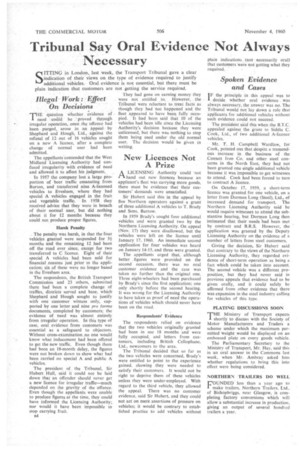Tribunal Say Oral Evidence Not Always
Page 38

If you've noticed an error in this article please click here to report it so we can fix it.
SITTING in London, last week, the Transport Tribunal gave a clear indication of their views on the type of evidence required to justify additional vehicles. Oral evidence is not essential, but there must be plain indication that customers are not getting the service required, illegal -Work,: -Effect On Decisions.
THE question whether_ evidence of I needCmild, . be proved through irregular operation, once, the offence had been purged, arose in an appeal by Shephard and Hough, Ltd., against the refusal of .12 out of 16 vehicles sought on a new A licence, after a complete change of normal user had been admitted.
The appellants...contended that the West Midland Licensing Authority had confused irregularity with evidence of need and allowed it to affect his judgment.. , In 1957 the company lost a large proportion of beer traffic emanating from Burton, and transferred nine A-licensed vehicles to Evesham, where they had special A vehicles engaged in the fruit and vegetable traffic. In 1958 they received advice that they were in breach of their normal user, but did nothing about it for 12 months because they could not produce proper figures, Harsh Penalty The penalty was harsh, in that the four vehicles granted were suspended for 31 months and the remaining 12 had been off the road ever since, except for two transferred to C licence. Eight of their special A vehicles had been sold for financial reasons just prior to the application; six of these were no longer based in the Evesham area.
The respondents, the British Transport Commission and 23 others, submitted there had been a complete change of traffics, districts served and base, which Shephard and Hough sought to justify with one customer witness only, supported by one letter and nine pro forma documents, completed by customers; the evidence of need was almost entirely from irregular operation. In this type of case, oral evidence from customers was essential as a safeguard to objectors. Without cross-examination no one would know what inducement had been offered to get the new traffic, Even though there had been an 18-month delay, the figures were not broken down to show what had been carried on special A and public A vehicles, The president of the Tribunal, Sir Hubert Hull, said it could not be laid down that an offender should never get a new licence for irregular traffic—much depended on the gravity of the offence. Even though the appellants were unable to produce figures at the time, they could have informed the Licensing Authority;. nor would it have been impossible to stop carrying fruit.
n4 They had gone on earning money they were not entitled to. However, the Tribunal were reluctant to treat facts as though they had not happened and the fleet appeared to have been fully occupied.: It had been said that 10 of the vehicles had been idle since the Licensing Authority's decision because they were unlicensed, but there was nothing to stop them being used under the old normal user. The decision would be given in writing.
New Licences Not A Prize
ALICENSING Authority 'could 'not hand out new licences because an applicant's fleet was carrying more goods, there must be evidence that their customers' demands were unsatisfied.
Sir Hubert said this in the appeal by five Northern operators against a grant of three additional A vehicles to T. Brady and Sons, Barrow.
In 1959 prady's sought four additional vehicles and were granted two by the Northern Licensing Authority. On appeal (Nov. 17) they were disallowed, but the vehicles were left on the licence until January 17, 1960. An immediate second application for four vehicles was heard on January 14-15, and three were granted.
The appellants urged that, although better figures were provided on the second occasion, there was no oral customer evidence and the case was taken no further than the original one. Three eight-wheelers had been purchased by Brady's since the first application; one only shortly before the second hearing. It was wrong for the Licensing Authority to have taken as proof of need the operations of vehicles which should never have been on the road.
Respondents' Evidence The respondents relied on evidence that the two vehicles originally granted had been in use 18 months and were fully occupied, and letters from customers, including British Cellophane, Ltd., newcomers to the area, The Tribunal decided that so far as the two vehicles were concerned, Brady's were entitled to point to the experience gained, showing they were needed to satisfy their customers. It would not be right to deprive them of these vehicles unless they were under-employed. With regard to the third vehicle, they allowed the appeal. There was no customer evidence, said Sir Hubert, and they could not act on mere assertions of pressure on vehicles; it would be contrary to established practice to add vehicles without
that -customers were not getting what they required.
























































































































